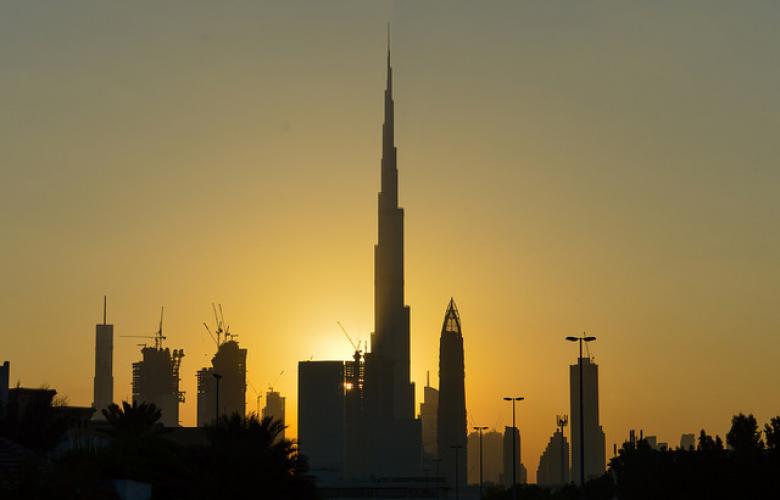Renting a property in Dubai
This article is intended as a preliminary guide only and refers to some but not all elements required to consider in detail prior to starting any property dealings or due diligence. Property dealings are often complex, especially in foreign countries and we highly recommend you seek independent professional advice... read more...
In Dubai, there are both new developments and older properties available for lease. Consider enlisting the services of an agent especially if you are unfamiliar with Dubai. There are many real estate agents available, reflecting the general diversity of the population. Each works to different ethics and standards, so find one you are comfortable working with and in whom you trust.
Finding a property in Dubai
Many properties in Dubai are listed on property search websites and agents will post their properties on there daily. A landlord can list his property with several agents. It is also common for an agent to send a client directly to a property without meeting them there. Confirm viewing appointments a day in advance, and reconfirm an hour before you go. Ask who you are going to be meeting, and where. Try to confirm which apartment/villa you are going to see and make sure you haven't seen it already. If you find an apartment you like, put the offer through the agent who showed it to you. By shopping for a better price through a different agent, the landlord will think that there are several interested parties and will be firmer on his price.
The paper work
The agent is responsible for arranging all the paperwork, and drawing up contracts. Before handing over any money you should see all the ownership documents, and also make sure that the agent is registered with the Real Estate Regulatory Agency (RERA), as it is illegal to deal with an unauthorised freelance agent. Try to do the paperwork in their office and never make rent cheques payable to an agent unless they have a valid Power of Attorney (POA).
Who can enter into a long term rental agreement
Rental contracts are for a fixed term of one year from the start date. There is a legal requirement that obligates the landlord to offer the same terms the following year, however this can be superseded by the actual terms on the contract, so read the contract carefully. There is a period of notice at the end of a contract, where you tell the landlord whether or not you intend to stay. If you fail to give notice, you will be legally bound to renew the lease on the same terms.
You are not legally allowed to rent a long term apartment without a valid residence visa. However, the banks will allow you to open an account with a letter from your employer stating that the visa is under process. If for any reason your visa does not come through, you will forfeit any legal right to money spent on rent for the apartment.
Leases are paid annually in advance via predated cheque(s). The landlord will dictate the number of cheques required between 1 and 12 cheques with 3-4 being the average.
Only make cheques payable to the registered owner. Confirm the name of the owner by sighting the title deed, or the sales contract. You may also make payment to a Power of Attorney (POA). In this instance it is wise to have the POA document checked. These are commonly in Arabic, and will sometimes be dated but they should have the court stamps and stickers attached. If it is a copy and you have doubts, ask to see the original.
Utility Bills
Every property in Dubai needs to have Dubai Electric and Water (DEWA) connected. In addition, you will also be liable for a housing fee. This is a tax collected through DEWA, amounting to 5% of the total rent for the year, split into monthly payments. You can pay DEWA online, and at petrol stations.
In an apartment, you may also have a ‘chiller’ fee. This is where the central air conditioning is charged per apartment. Palm and JBR are affected by this, as are some tower-blocks on the Marina and Downtown. Calculate for this fee is as it can make an inexpensive apartment less of a bargain.
Property location determines which service supplier is used for TV, internet and landline. It will be either Du or Etisalat, and both are fairly expensive, so make sure you choose the package that best suits your needs as changing it later is difficult.
Gas supply is different for each building, with most just being a simple canister, so be aware of this when you are viewing a potential property.
Popular areas to live
Here is a brief overview you can choose from:
Arabian ranches- Very popular with families. Range from 2 bed townhouses to 6 bed Hattan villas.
Marina-The quality varies in the different towers. Consider developments by Emaar, Cayan, Trident. For bigger families and bigger budgets then the Original 6 is probably the best development.
Palm- Possibly the best place to live in Dubai! Good mix of villas and apartments. All a little bigger then the norm in the Marina, from modestly priced to very expensive.
Downtown- This covers all the big towers of Shiekh Zayed and all the Emaar area around Dubai Mall. A very popular place, like the Marina but possibly better situated with more amenities. Dubai International Financial Centre (DIFC) is very close and is an upcoming area of Dubai.
Greens- Very nice lower priced family area of high and low rise apartments with a mix of shops and facilities.
Al Barsha Heights (formerly Tecom)- Lower priced apartments with convenient shops and amenities. Close to the Mall of Emirates and all the attendant facilities. Good links to the Metro as well.
Diera/Bur Dubai- In the older part of Dubai, this area is less westernised. There is a great diversity of apartments and villas, but you will need to source a specialist to guide you through this area.
Jumeirah/Umm Sequim- The accommodation here ranges from exclusive to dilapidated, and this is an area where a good guide would be useful.
Mirdiff- Cheap and cheerful housing, larger than many other areas mentioned, but several pitfalls. Large parts of this area are directly under the flight-path of Dubai Airport, so it can be very noisy. The villas are independently owned and maintenance can be hit and miss.
JBR- Easy access to the shops bars and restaurants, and of course the beach, but the apartments tend to be dark, with small balconies, and unusual floor-plans.
General tips
When commencing a new lease, the property should be freshly painted, but ensure you request it. It is also understood that you will repaint when vacating. This amount can be deducted from the security deposit at the end of the tenancy.
When renegotiating a lease, you should consider the rental indicator prior to discussion with the landlord or their agent. See the link here.
What if I have a complaint?
RERA role is regulatory and provides basic service to safeguard the rights of landlords and tenants and to regulate the leasing process by registering the tenancy contract. In case there is a violation or dispute between contract parties, the case must be referred to Dubai's Rental Dispute Settlement Centre located at Dubai Land Department.
Find more information here.
Precautionary advice
According to the Dubai Real Properties, there are a few things to be aware of when renting property in Dubai:
- Do not issue any rental cheque or payment in favour of a real estate agent or company. Hand in the amount concerning rent, advance deposits and other bills to the original property/land owner.
- Do not trust ‘freelance real estate agents’. Ensure they are registered with RERA.
- Never part with any money until you have personally inspected a property – upfront payments and contracts before you’ve set foot inside a prospective dwelling are very unusual unless purchasing off-plan.
- Verify the identity of the seller by cross-referencing the title deed and owners details under the ownership certificate section on the Dubai Brokers App. Your broker can do this for you.
- Take a dim view of properties poor quality photos and description.
- Never give any personal information or documents (bank account details, ID numbers, etc.) over the internet before you’ve met in person and verified the identity of the seller/landlord and their agents.
- Realise that if something sounds too good to be true, it probably is. If a lovely home in a sought-after area has a suspiciously affordable price tag you need to address these red flags and inspect every aspect of the offer carefully before becoming entangled in a scam.
- Something as simple as a suspicious email address can point to a scam – very few agents will do business from a Gmail or Yahoo account. If you can’t verify the bricks and mortar address of a prospective real estate contact, it’s best to seek assistance elsewhere.
Here are some useful links for electricity, water and telecommunications:
Dubai Electricity & Water Authority
Emirates Integrated Telecommunications Company
Article sources:
See also:
How to buy and rent property in the UAE
Glossary of terms for real estate in the UAE
This article and the above linked artciles are not complete and are intended as preliminary guides only. These guides refer to some elements to consider prior to starting any property dealings or due diligence. Property dealings are often complex areas, especially in foreign countries and we highly recommend you seek independent professional advice... read more...




